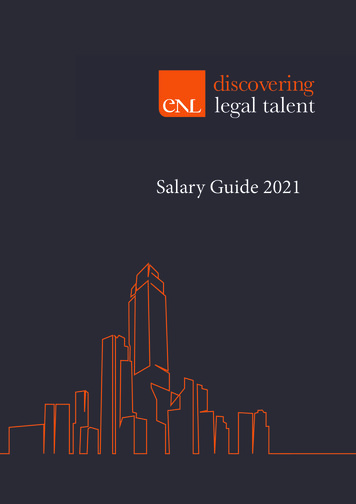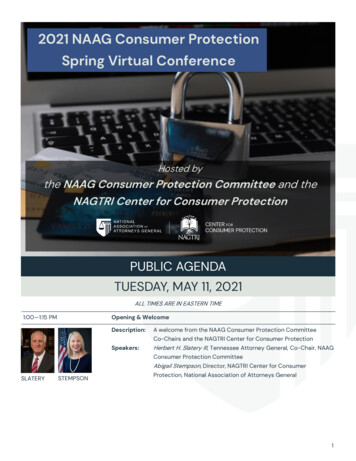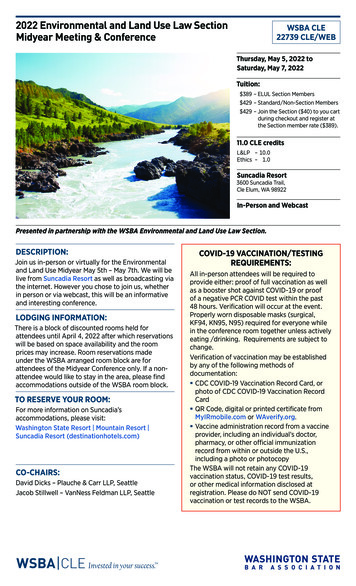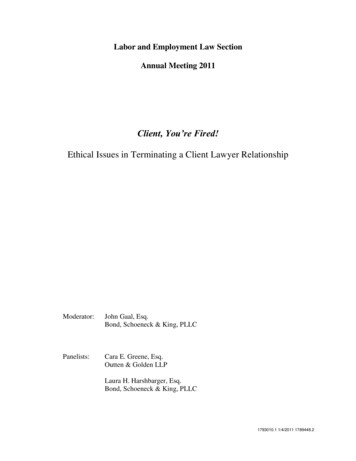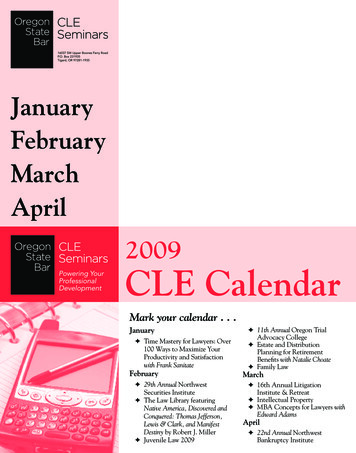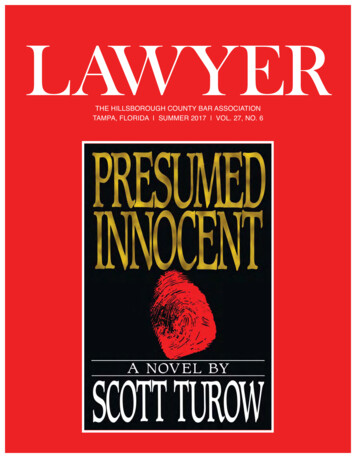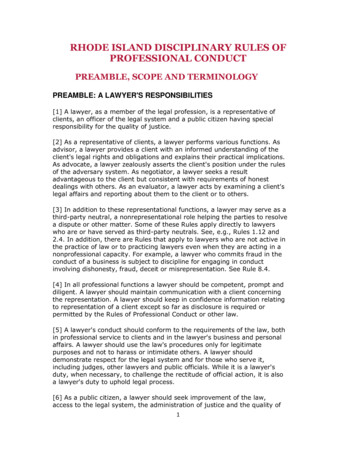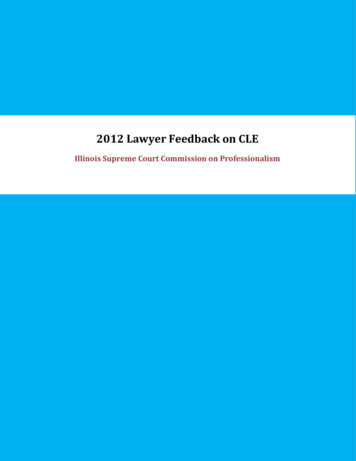
Transcription
2012 Lawyer Feedback on CLEIllinois Supreme Court Commission on Professionalism
Illinois Supreme Court Commission on ProfessionalismSurvey: Lawyer Feedback on CLEIn April 2012, the Illinois Supreme Court Commission on Professionalism conducted a webbased survey of the legal community. The purpose of the survey was to gather feedback fromlawyers about their participation in professional responsibility CLE courses and activities andto garner ideas for strengthening professional responsibility education for Illinois lawyers.The Legal Community Survey explored the following topic areas:1.Extent of participation in professional responsibility CLE courses;2.Areas of content included in professional responsibility courses and activities;3.Preference of online learning presentations over in-person presentations;4.Utilization of non-traditional professional responsibility CLE credits;5.Utilization of social media sites and online forums for educational or professionalismpurposes;6.Lawyers’ perceptions regarding the following:a. depth of content of CLE presentation;b. practical application of CLE presentation;c. increased skills from CLE participation;d. increased professionalism from CLE participation;e. applicability of CLE presentation.7.Ideas for improving continuing legal education and other feedback and comments.Methodology & ResponseThe Illinois Attorney Registration and Disciplinary Commission (ARDC) provided the emailaddresses of attorneys from its 2012 master roll. A total of 6,313 lawyers completed the onlinesurvey. The results are shown in narrative and chart form on the following pages.Lawyer FeedbackPage 2
Illinois Supreme Court Commission on ProfessionalismSummary of Findings1.Attorney Opinion of CLE coursesLawyers were asked the extent to which they agreed with this statement: “I participated in aprofessional responsibility CLE course that resulted in my increased knowledge or capability.”The majority of lawyers “agreed” with the statement (61.6%).2.Content Areas of Professional Responsibility CLEThe scope of what may be considered professional responsibility CLE is broad, defined bySupreme Court Rule 794(d) as the areas of “professionalism, diversity issues, mental illness andaddiction issues, civility, or legal ethics.” There can be significant overlap between these areasand often the professional responsibility CLE course will entail more than one area. Attorneyswere asked to identify the content areas contained in their professional responsibility courses.Most (88.6%) indicated that their professional responsibility CLE included legal ethics.Lawyer FeedbackPage 3
Illinois Supreme Court Commission on Professionalism3.Professional Responsibility via Online LearningOnline learning is the delivery of continuing legal education via the Internet to participants notphysically in the room with the faculty. It provides access to learning when the faculty and thelearners are separated by time or distance, or both. The survey results show that more than half ofrespondents preferred to acquire their CLE online rather than through live presentation.4.Non-traditional CLE CreditAttorneys were asked if they received credit for non-traditional professional responsibility coursesor activities, defined under Rule 795(d) as: law school course attendance, bar association meetings,part-time teaching of law course, or legal scholarship. Approximately half of the respondents statedthey had applied for non-traditional CLE credit. Bar Association meetings were the most utilizednon-traditional credit option.Lawyer FeedbackPage 4
Illinois Supreme Court Commission on Professionalism5.CLE Results—Knowledge or CapabilitySocial media, or Web 2.0 as it has come to be known, has provided a potent internet tool forattorneys to use. Attorneys use social media sites for networking, marketing, client research,education, trial preparation, and as social members of the general population. Attorneys wereasked what online channels they used to stay current with the legal profession and/or networkwith other lawyers. The survey results show that the majority of attorneys used LinkedIn (64.9%).6.CLE Results—Application of LearningFinally, attorneys were asked their opinions of the professional responsibility CLE courses in whichthey participated. Attorneys were asked whether the professional responsibility CLE course (1)provided in-depth content; (2) offered practical information; (3) offered skill building activities; (4)strengthened professionalism, and/or (5) applied to the attorney’s practice area. Theoverwhelming majority, 73.3% found that the CLE offered them with practical information.Lawyer FeedbackPage 5
Illinois Supreme Court Commission on Professionalism7.Other FeedbackAttorneys were asked to share comments generally. 1564 attorneys (24.7% of survey participants)submitted commentary. Their comments were not limited to professional responsibility CLE butrather included general CLE as well. These submissions were analyzed and categorized by topic.The prevailing topics included the following:A.The 30 CLE Hours RequirementRespondents commonly complained about the “burdensome” nature of the CLE hoursrequirement. Reasons included the trying economic conditions, having to take asignificant portion out of one’s day to attend CLE, and the relatively high number ofIllinois hours as compared to other jurisdictions. “The constantly increasing hours of required CLE are quickly becoming a realburden. Non-online courses require travel time which often is the same as thecourse credit hours In this economy the impact on earnings is both real andsignificant.” “My feeling is that the 30 hour requirement is too much. What I’ve found is that Iwait too long to get started along with other lawyers I know and there is too muchpressure to meet the deadline. Maybe just an annual requirement (with fewerhours) is easier to comply.” “The CLE requirements are too high. There’s no reason the number of hours needsto be over 10-15.” “20-24 hours of CLE is effective. Beyond that many attorneys are filling theadditional time requirement and repeating the same courses over and overwithout measurable increase in educational information.” “Illinois is requiring too many hours of CLE in just a two year period. The previoustotal of 24 hours was much more workable than the current demand for 30 hours.”B. Mandatory CLEAttorneys criticized the mandatory nature of CLE requirements. Several argued for thereturn of voluntary CLE.Lawyer Feedback “Mandatory CLE is not a practice enhancer. “Available” CLE on an “as desired”basis is more appropriate, professional and meaningful.” “I keep up with educational updates voluntarily and I have done so ever since Ibecame an attorney licensed in Illinois. I believe this is part of the ethicalresponsibility to fully represent your client. Mandatory CLE seems to be just anadditional bureaucratic burden and I hope that at some point we reconsider thisrequirement and leave it to the attorneys to do their jobs.” “Mandatory CLE should be eliminated. It is a waste of time and resources. Anycompetent lawyer will make a point to stay current, and if he or she does not,mandatory CLE will not do anything for them. Mandatory CLE merely increaseslawyers’ costs and, thus, costs for consumers.” “CLE is a complete waste of time, as we are forced to take classes. If lawyers weretaking the classes voluntarily they would be more interested and focused on thematerials.”Page 6
Illinois Supreme Court Commission on ProfessionalismC. The Professional Responsibility RequirementMany respondents found the professional responsibility requirement overly burdensomeand unhelpful to their practice. Several attorneys felt that ethics and civility were nottopics that could be taught. Others were confused as to what constituted professionalresponsibility. Many responded that six hours was too high a requirement. “Four hours of new, useful professional responsibility instruction is hard to comeby each reporting period. So far, only one hour this reporting period has beenuseful to me. I expect most future professional responsibility content will berepetitive.” “I do not think you can teach professional responsibility. Very few of the courses Ihave taken have provided me with useful information and I find the requirementfor professional responsibility – especially hours in specific areas such as substanceabuse, to be burdensome.” “I find Professional Responsibility CLEs to be a waste of time. You either haveethics or you don’t. For those that don’t, requiring six hours of ProfessionalResponsibility CLEs every 2 years isn’t going to change that.” “I believe ethics, civility, etc. are things that are learned in childhood. I feel like thecontent of these seminars are “preaching to the choir”. Overall I find them to beuseless.” “These CLE courses are a waste of time. Those of us who are honest don’t need tobe reminded how to act. The “good eggs” are forced to suffer so some politicos canclaim they are doing something about unethical lawyers. Forcing these classes onthem will not suddenly make the disreputable members of our profession betterpeople.” “A more creative way of conveying the need for better professionalism is needed.Maybe the use of satire, irony, a comic strip or something that would get readersattention could be helpful. What about a professional tip of the day via email.Short, sweet, to the point and tie it in with making .”D. The High Cost of CLE CoursesRespondents commonly complained about the high cost of CLEs, particularly in light ofthe economic downturn. Several thought of CLEs as a way for the ARDC, the barassociations and private companies to generate additional income.Lawyer Feedback “I do not believe in the CLE requirements! I find that most are not helpful, with thesole purpose of requiring CLE’s to generate income.” “CLE seems to be a boom for those who provide and a bust for those who have totake it.” “Unfortunately, it seems that a good part of the CLE Program is aimed at providingan additional income stream to the Illinois Bar. Much of the CLE is costly! It alsoappears that many instructors, enticed by the prospect of making money off theCLE Program, have jumped on this “cash cow.” “The continuing education program is largely a farce benefiting the packagers ofinformation more than the lawyers who participate. Why aren’t you aware ofthis?”Page 7
Illinois Supreme Court Commission on Professionalism “For those of us not working at large firms and who have to shoulder the expenseof CLE ourselves from our personal checkbooks, the cost of CLE is veryburdensome.” “It would be a help if free or affordable classes were sponsored by you, during thesedifficult times when lawyers income has been so reduced.” “I was laid off from a large firm last year and have yet to find full timeemployment. Cost should be considered since CLE is required. I could barely paymy ARDC fees - cannot attend in person free seminars when I am doing temp docreview work and cannot afford the cost for most programs.” “There should be more opportunities for free CLE. Recent grads are alreadystruggling tremendously to pay loans. Bars fees, annual license fees and expensiveCLE are just piling on the stress. I am forced to take all the free CLE I can, eventhough most is not relevant to my practice area, because I can’t afford anythingelse.”E. Utility of CLE GenerallyThe overwhelming majority of respondents could not see the value of CLE. They felt thattheir time was better spent serving clients rather than attending CLE classes. Severalrespondents requested statistics showing that CLE has demonstrably improved theprofession. “The CLE system is a joke. Lawyers are essentially required to sit in a room withsomeone speaking, providing little if any information, while most lawyers read thenewspaper, e-mail each other jokes, or do work. The CLE system does not actuallyeducate many people of anything, it, instead, merely increases costs to lawyers,who must pay yet another fee, or take time off work, in order to attend hours ofclasses, of which there is no real benefit. A good practicing lawyer will keep upwith new matters in their area of representation, which will be old news by thetime it is CLE time the CLE is simply a feel good waste of time and money.” “I believe I, and most attorneys would be better off spending the money on legalresearch for our offices then these expensive and in most cases, poorly writtenmaterials and lectures. I would like to see published statistics showing thatmandatory CLE has substantially improved the profession and greatly reduced theclaims of malpractice and negligence regarding a lawyer’s handling of a client’scase.” “You should also ask these important questions: How many attorneys take coursesthat turn out to be worthless just to fill in a few missing hours?” “CLE is a waste of my very limited and valuable time. Didn’t anyone consider thatthe practice of law represents an everyday continuing legal education? What isnext? Periodic testing?”F. Utility of CLE to State and Federal EmployeesGovernment employee respondents frequently felt that CLEs were unnecessary as awhole, either due to their internal professional requirements or due to the inapplicablecontent of most CLE courses. Others believed that it was difficult for them to obtain CLEcredit either due to their job responsibilities, or to the lack of CLE offerings by theirLawyer FeedbackPage 8
Illinois Supreme Court Commission on Professionalismagency. Finally, several could not understand the CLE exemption for certain governmentemployees, but not others. “Because of the unique nature of our practice, I believe attorneys employed by theFederal government should be exempt from all but theprofessionalism/professional responsibility requirements. It’s silly to require us totake CLEs that are not related to our federal field off practice to check a CLErequirement block. Virtually all Federal agencies have internal requirements tomaintain proficiency.” “CLE requirements are very difficult to do for government attorneys I don’tunderstand the waiver for active duty military attorneys, but not for activepracticing government attorneys outside Illinois.” “Due to the nature of my job, appellate defender, I need to stay abreast of the laweven without the CLE requirements. The time I have to spend on meeting my CLErequirements does not really increase my knowledge of the law in my field andactually detracts from the time I spend keeping up with the law through my job.” “I work for the US Army as a civilian and it is very difficult to get classes I attendwithin the Army legal framework to be CLE accredited because of the rule that thepresenter needs to get the class accredited. The presenters are presenting federallegal education to lawyers who are licensed in many different states and arereluctant to the pay the fee for each state.” “The courses are all aimed at private practitioners. I work for the federalgovernment and usually feel like a complete fish out of water at local CLE coursesas I don’t face most issues covered in the courses in my daily practice.” “I work as a federal administrative judge on security clearance cases. There are nopertinent courses for us and you do not give us an exemption as you doadministrative law judges.”G. Utility of CLE to Attorneys in Certain Practice AreasSeveral attorneys who were in favor of CLE found themselves frustrated due to the lackof CLEs in their practice areas. Many were non-litigation attorneys, such as in-housecounsel, tax attorneys, and real estate lawyers.Lawyer Feedback “I am general counsel for a global company. I live abroad. None of the standardCLE course offerings benefit me in my professional growth or knowledge. Quitefrankly, I would benefit more from being able to take commercial or labor lawcourses relating to law in other countries than what I can receive in current CLEofferings.” “As an attorney specializing in basically one field of law – transactional real estate– I feel that the whole concept of CLE is a waste of time and money, and quitefrankly is insulting. I keep current on the area of law in which I practice because Ineed to and I want to, not because it is mandated and I will be punished if I do not.Each “reporting period” I am forced to look for courses to take that have nobearing on my practice, waste incredible amounts of my time, and cost me moneythat I really cannot afford right now.” “I have been terribly dissatisfied with the ethics and professional responsibilitycourses I have attended The courses tend to focus in on matters that just do notPage 9
Illinois Supreme Court Commission on Professionalismcome up and ignore the kinds of things an experienced lawyer in commercialpractices encounters all the time.” “The ethics courses provided are completely irrelevant to in-house counsel. Theyare frankly a waste of attorney time. There should be better ethics courses thatrelate to all practice types, not just sole practitioners who co-mingle funds or whohave addiction issues.”H. Utility of CLE to Experienced AttorneysMany experienced attorneys did not understand the necessity of mandatory CLE afterhaving practiced for a number of years. Older attorneys in particular found the CLErequirements unduly burdensome.I. “I don’t see much value in the professional responsibility courses when I have beenpracticing for 40 years.” “Consideration should be given to reducing the CLE hours requirement for Retiredlawyers who wish to keep their law license active.” “I suggest that CLE requirements be lessened for attorneys that have reached acertain age or a certain number of years in practice. These attorneys, like me, dovery little legal work, know their area of expertise, keep up on new developmentsin that area, and know when the client’s situation exceeds the attorney’sknowledge. Some States do have reduced CLE requirements for attorneys reachinga certain age of years of practice.” I wanted to retain my law license when I retired from my full time public servicework, but CLE courses were so expensive that I was forced to move to inactivestatus.”Availability of Online CLE ClassesAttorneys both praised and criticized the availability of CLE classes online. Those infavor of online classes found that the classes allowed attorneys to attend around theirown schedules, and did not require them to travel or take substantial time out of theirday. Those against online classes argued that attorneys simply sat in front of thecomputer and paid little to no attention to the online class, or had assistants take theclass for them.Lawyer Feedback “As a parent with a first grader, it is unbelievably helpful to be able to do CLEonline.” “I can’t stress enough the importance of being able to take courses remotely. I donot believe that people get any more out of a course simply by attending in person– you only have to be an instructor once to know that physical presence does notnecessarily signal mental presence!” “Online courses are more practical as they require less time out of the work day.In addition, I have found them to be more informative.” “I have really appreciated the on-line webinars, but I always prefer to interact 1:1.However, if it weren’t for on-line courses I probably wouldn’t be able to fulfill myrequirements. Since travel money is almost non-existent, the on-line courses arealmost a necessity.”Page 10
Illinois Supreme Court Commission on ProfessionalismJ. “A lot of my buddies had their paralegals do the online courses for them. This iswhy online courses should be stopped.” “If we are going to continue to have MCLE, I strongly disagree with providing online credit for course viewing. How does one know that the lawyer actually viewedthe program on the lawyer’s monitor or was the lawyer preparing a closing,closing argument, brief or vacation plans. There has to be interactiveparticipation so that the lawyer actually engages the material. Otherwise, it is amoney making proposition for the provider and a time saving measure for thelawyer.”Non-Traditional CLE ExpansionA minority of attorneys wanted the CLE rules revised to allow for more non-traditionalcredit opportunities. Credit for pro bono hours was a frequent request by theserespondents.Lawyer Feedback “Would urge that ARDC Hearing Board members get some PR credit for time spentin connection with hearings.” “I participate in many legal organizations, volunteer for law-related events, am onmany legal Boards and participate in law-activities. I even organized a programthat is used by the courts.I think it would be appropriate to get credit for theseactivities. These take up a lot of time, energy and funds; I enjoy themtremendously, but you should consider giving credit for these types of activities.” “Give credit for ProBono Hours. i.e., for every 100 hours 1/2 credit.”Page 11
Illinois Supreme Court Commission on ProfessionalismConclusions and RecommendationsThe 2012 survey results are strikingly similar to the 2009 survey results, with an ever increasingfocus on the cost of CLE classes. Several attorneys had positive comments about CLE, howevermany remained skeptical about the utility of CLE and the utility of professional responsibility.While 61.6% of attorneys attended professional responsibility CLE courses with practicalapplication to their profession, 16.6% (over 1000 attorneys) did not.Part of the issue might be that the majority of respondents, 88.6%, took courses focused on legalethics. Many of the respondents in their commentary believed that the professional responsibilityrequirement was the equivalent of an ethics requirement. Several complained that the ethicsclasses provided the same content year after year, and as such, those attorneys felt the classesredundant and unnecessary. The Commission recommends that lawyers obtain a betterunderstanding of what constitutes professional responsibility and take advantage of the wide rangeof courses available outside of legal ethics. Similarly, the Commission recommends that providersoffer more courses outside of legal ethics to increase attorney enthusiasm for the professionalresponsibility requirement.One response of particular note is that while 58.9% of attorneys preferred to obtain their CLEonline, 41.1% of attorneys did not. Given the convenience and accessibility of online CLE, the 3000some attorneys who preferred in-person classes must find an advantage to these classes that theydid not find in online classes. We can gather from the comments that many attorneys found inperson classes more useful than their online classes, or conversely, found online classes lessinteresting than in-person classes. More follow-up on the utility of online CLE (versus theconvenience of it) should be done.Finally, the most common complaints, the 30 hour mandatory requirement and the cost of the CLE,are intertwined. The majority of attorneys surveyed did not understand the necessity of CLE. Thatfrustration has only increased as the economic downturn has continued resulting in greaternumbers of attorneys admitted to the bar who are (1) unemployed, (2) underemployed, or (3)otherwise unable to afford the time or money for CLE classes. The Commission recommendsincreasing awareness among Illinois attorneys of the utility and benefits of 30 hours of mandatoryCLE.Lawyer FeedbackPage 12
Cost should be considered since CLE is required. I could barely pay my ARDC fees - cannot attend in person free seminars when I am doing temp doc . "There should be more opportunities for free CLE. Recent grads are already struggling tremendously to pay loans. Bars fees, annual license fees and expensive CLE are just piling on the stress. I .
